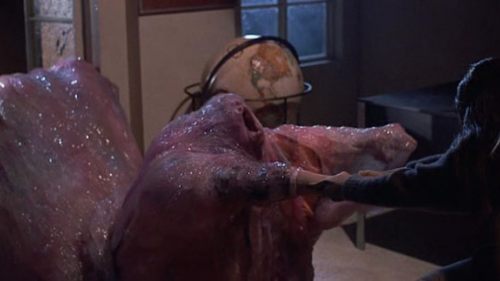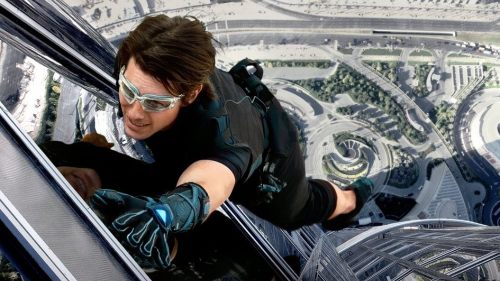Sunday Reads: THE HOUSE OF YES Had A Weirder Thanksgiving Than You Did
Long before Mark Waters directed Tina Fey's Mean Girls, he made his directorial debut with the delightfully dark indie comedy The House of Yes. Starring Parker Posey, Josh Hamilton, Tori Spelling, Rachael Leigh Cook and Freddie Prinze Jr., it's as if Waters practically wrote his own '90s fanfic. It's a movie that uses a twisted obsession with the JFK assassination to unify trauma and family -- so really, it's the perfect Thanksgiving film. And it takes place during Thanksgiving.
The opening sequence is curiously layered -- Parker Posey's adult Jacqueline narrates over home video footage shot by her twin brother, Marty (Hamilton). We watch as young Jackie (Rachael Leigh Cook) gives a tour of their family's Virginia estate, a prim and precocious imitation of the real Jackie Onassis, whose famous black and white White House tour footage is intermingled throughout. As the tour goes on, Cook's Jackie becomes a manic, twee apparition in her pink Chanel suit, dashing about, while the real Jackie O remains helplessly frozen in time, her footage edited to match the deranged display -- much as Cook the actress has remained, in our minds, forever trapped in the late '90s and early '00s. There's something ghastly and yet sort of precious about seeing her face in these home movies within a movie; as if she never really existed outside of film.
Flash forward to 1983, when Marty brings his fiancée Lesly (a surprisingly subdued Tori Spelling, who was still trying to prove herself) home for Thanksgiving to meet his family. Nerves are alight -- there's a hurricane coming, a dinner to be prepared, and everyone seems to be walking on eggshells around Marty's sister, Jackie O, who suffers from borderline personality disorder. But that's the thing about disorders, isn't it? They aren't so much disorders as they are diseases. Just like drug addiction and alcoholism, mental health disorders are viral and infect everyone around you, until they're sort of trapped. And it's tricky because with someone as wildly unpredictable as Jackie -- who has little "accidents" --you never know if what you're doing is right or wrong, if you're enabling or helping, and pretty soon there's no difference between the sick and the well, the sane and the insane. The lines have all blurred into one another like red wine that's spilled on white linen -- it just spreads and spreads. You're damned if you do and damned if you don't.
But Jackie's illness isn't the big family secret. Enter Anthony (Prinze Jr. -- who is surprisingly, in a movie with Tori Spelling, the worst actor here), Jackie and Marty's weak-willed and sheltered younger brother. While Marty and Jackie renew their suspiciously intimate twin bond, Lesly starts becoming friendly with Anthony, who starts to open up about his brother and sister and the little game they play.
As previously noted, mental health disorders can be more aptly labeled as diseases, but they're also hereditary, likely to be passed from one generation to the next -- not that it's a guarantee that if your mother was depressed you will also suffer from depression, but that if your mother was depressed, you have the same predilection. These disorders are also cyclical and history is so fond of repeating itself; violence begets violence and so on and so forth. Something isn't right in the Pascal home -- their father died under circumstances no one is discussing, and Jackie is obsessed with a startlingly violent national tragedy that took place so close to a traditional family holiday.
The JFK assassination, to Jackie, represents a unification of violence and family, of the loss of her father and Thanksgiving; of death and life. The graceful Jackie Onassis loved her husband so dearly that she went after pieces of his head on the back of that presidential limousine. The day JFK was assassinated was the day Jackie and Marty lost their father, and so the two tragedies have been infinitely intertwined, creating a powerful, shared traumatic experience. And although they are twins who coped similarly with this experience as they came of age, their paths eventually diverged. Marty left the house, and Jackie remained trapped, frozen in time like the real Jackie Onassis, whose visage we now only know through old photographs and newsreels. The thing about cycles is that repetition is a comfort; through repetition we create habit, and through habits we make homes. Marty wants to break out of this cycle of playing the game, of the ritual of recreating the JFK assassination, and recreating the night they lost their father and their innocence. In whatever horror they witnessed that night, they lost themselves in each other and some part of their development became arrested and locked into that moment.
But Jackie likes the ritual. She needs the repetition -- the soothing effect of knowing that if Marty is Him and Jackie is Her, it will end the same way it always does because that's the way the game is played. It's the same as needing her hair brush to be right where she left it or wearing the same dress that she always does. She could do things another way, but she never has, and in Jackie's mind if she does anything differently her entire life will implode. This is obsession. This is compulsion. This is fear and co-dependency and we call it psychosis. This is Parker Posey and she rules.
This article was originally published in 2013.



